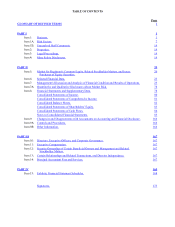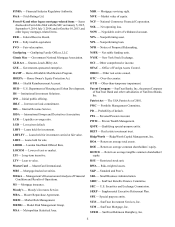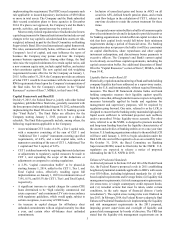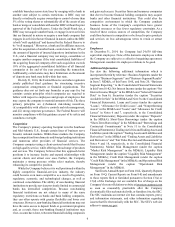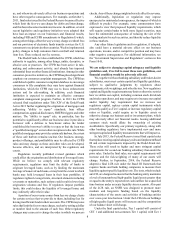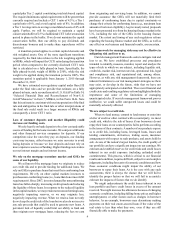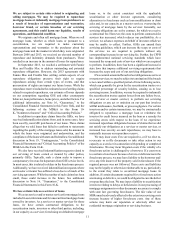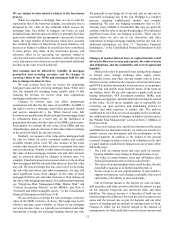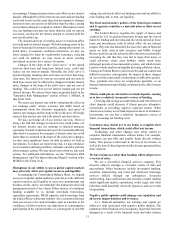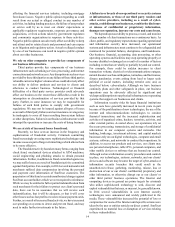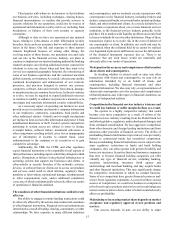SunTrust 2014 Annual Report Download - page 28
Download and view the complete annual report
Please find page 28 of the 2014 SunTrust annual report below. You can navigate through the pages in the report by either clicking on the pages listed below, or by using the keyword search tool below to find specific information within the annual report.5
FDIC regulations require that management report annually
on its responsibility for preparing its institution's financial
statements, establishing and maintaining an internal control
structure and procedures for financial reporting, and compliance
with designated laws and regulations concerning safety and
soundness.
The Dodd-Frank Act created the CFPB, which is separated
into five units: Research, Community Affairs, Complaint
Tracking and Collection, Office of Fair Lending and Equal
Opportunity, and Office of Financial Literacy. The CFPB has
broad power to adopt new regulations to protect consumers,
which power it may exercise at its discretion and so long as it
advances the general concept of the protection of consumers. In
particular, such regulations may further restrict the Company's
banking subsidiary from collecting overdraft fees or limit the
amount of overdraft fees that may be collected by the Company's
banking subsidiary beyond the limits imposed by the 2009
amendments to Regulation E discussed below.
Federal banking regulators, as required under the GLB Act,
have adopted rules limiting the ability of banks and other
financial institutions to disclose nonpublic information about
consumers to nonaffiliated third parties. The rules require
disclosure of privacy policies to consumers and, in some
circumstances, allow consumers to prevent disclosure of certain
personal information to nonaffiliated third parties. The privacy
provisions of the GLB Act affect how consumer information is
transmitted through diversified financial services companies and
conveyed to outside vendors.
There are limits and restrictions on transactions in which
the Bank and its subsidiaries may engage with the Company and
other Company subsidiaries. Sections 23A and 23B of the
Federal Reserve Act and the Federal Reserve's Regulation W,
among other things, govern the terms and conditions and limit
the amount of extensions of credit by the Bank and its
subsidiaries to the Company and other Company subsidiaries,
purchases of assets by the Bank and its subsidiaries from the
Company and other Company subsidiaries, and the amount of
collateral required to secure extensions of credit by the Bank and
its subsidiaries to the Company and other Company subsidiaries.
The Dodd-Frank Act significantly enhanced and expanded the
scope and coverage of the limitations imposed by Sections 23A
and 23B, in particular, by including within its scope derivative
transactions by and between the Bank or its subsidiaries and the
Company or other Company subsidiaries. The Federal Reserve
enforces the terms of 23A and 23B and audits the enterprise for
compliance.
In October 2011, the Federal Reserve and other regulators
jointly issued a proposed rule implementing requirements of a
new Section 13 to the BHC Act, commonly referred to as the
“Volcker Rule.” The regulatory agencies released final
implementing regulations on December 10, 2013, providing for
an extended conformance date through July 21, 2015, which has
been extended for one year (and is expected to be extended one
additional year) for a limited subset of covered fund holdings
and activities.
The Volcker Rule generally prohibits the Company and its
subsidiaries from (i) engaging in proprietary trading for its own
account, (ii) acquiring or retaining an ownership interest in or
sponsoring a “covered fund,” and (iii) entering into certain
relationships with a “covered fund,” all subject to certain
exceptions. The Volcker Rule also specifies certain limited
activities in which the Company and its subsidiaries may
continue to engage.
The Volcker Rule will further restrict and limit the types of
activities in which the Company and its subsidiaries may engage.
Moreover, it will require the Company and its subsidiaries to
adopt complex compliance monitoring and reporting systems in
order to assure compliance with the rule while engaging in
activities that the Company and its subsidiaries currently
conduct.
The Patriot Act substantially broadened existing anti-money
laundering legislation and the extraterritorial jurisdiction of the
U.S. It imposes compliance and due diligence obligations;
creates crimes and penalties; compels the production of
documents located both inside and outside the U.S., including
those of non-U.S. institutions that have a correspondent
relationship in the U.S.; and clarifies the safe harbor from civil
liability to clients. The U.S. Treasury has issued a number of
regulations that further clarify the Patriot Act's requirements or
provide more specific guidance on their application. The Patriot
Act requires all “financial institutions,” as defined, to establish
certain anti-money laundering compliance and due diligence
programs. The Patriot Act requires financial institutions that
maintain correspondent accounts for non-U.S. institutions, or
persons that are involved in private banking for “non-U.S.
persons” or their representatives, to establish, “appropriate,
specific and, where necessary, enhanced due diligence policies,
procedures, and controls that are reasonably designed to detect
and report instances of money laundering through those
accounts.” Recently the Financial Crimes Enforcement
Network, which drafts regulations implementing the Patriot Act
and other anti-money laundering and bank secrecy act
legislation, proposed a rule that would require financial
institutions to obtain beneficial ownership information with
respect to all legal entities with which such institutions conduct
business. The scope and compliance requirements of such a rule
have yet to be formalized or completed. Bank regulators are
focusing their examinations on anti-money laundering
compliance, and the Company continues to enhance its anti-
money laundering compliance programs.
During the fourth quarter of 2011, the Federal Reserve's final
rules related to debit card interchange fees became effective.
These rules significantly limit the amount of interchange fees
that the Company may charge for electronic debit transactions.
Similarly, in 2009, the Federal Reserve adopted amendments to
its Regulation E that restrict the Company's ability to charge its
clients overdraft fees for ATM and everyday debit card
transactions. Pursuant to the adopted regulation, clients must opt-
in to an overdraft service in order for banks to collect overdraft
fees. Overdraft fees represent a significant amount of noninterest
fees collected by the Company's banking subsidiary. The CFPB
also has amended Regulation E to impose certain disclosure and
other requirements on the Company’s provision of electronic
funds transfer services for U.S. consumers to recipients in other
countries.
Pursuant to the Riegle-Neal Interstate Banking and
Branching Efficiency Act of 1994, and, as amended by the Dodd-
Frank Act, bank holding companies from any state may acquire
banks located in any other state, subject to certain conditions,
including concentration limits. Additionally, a bank may




